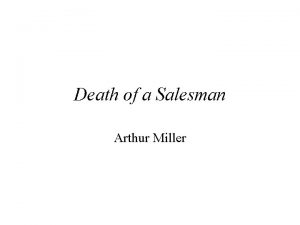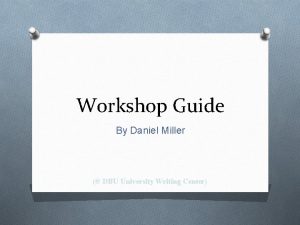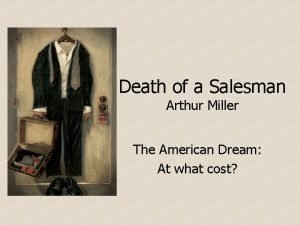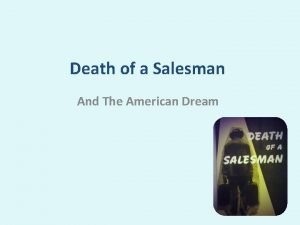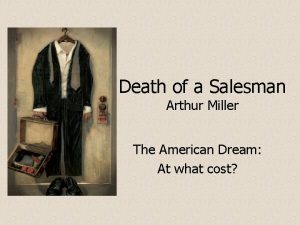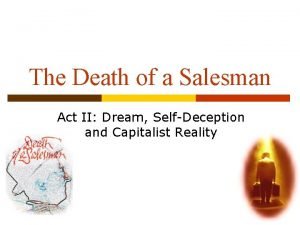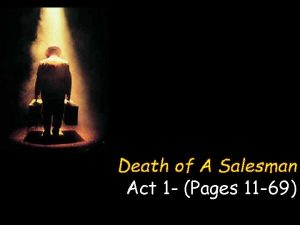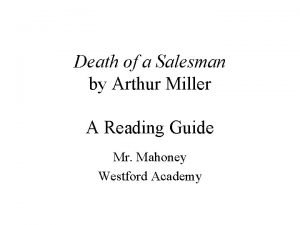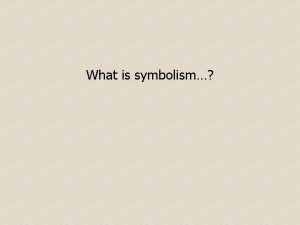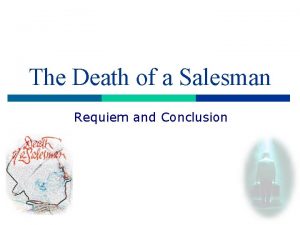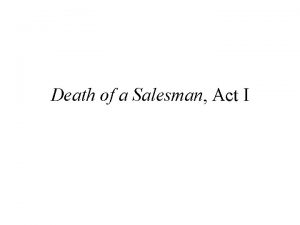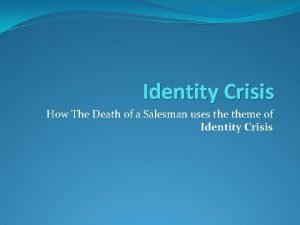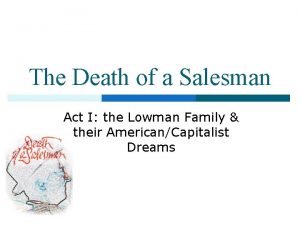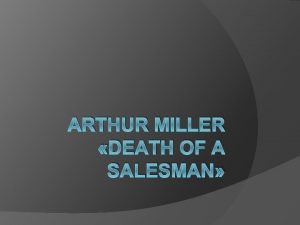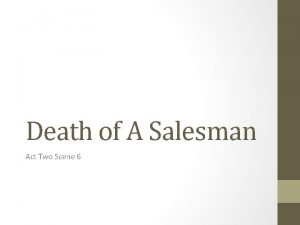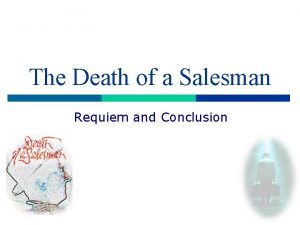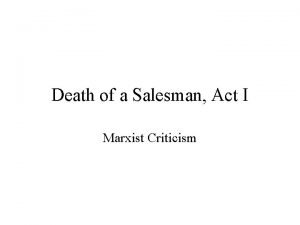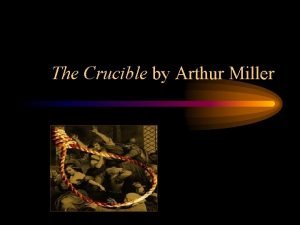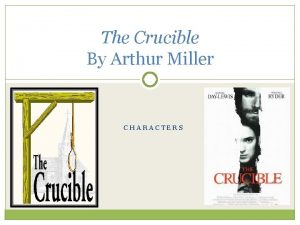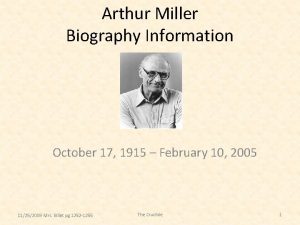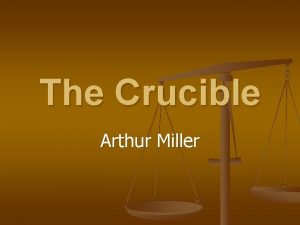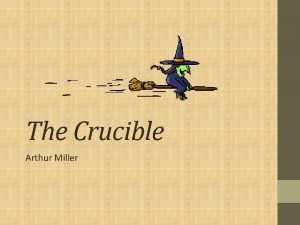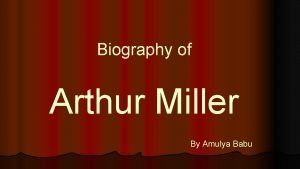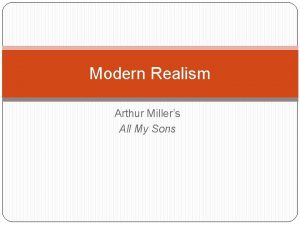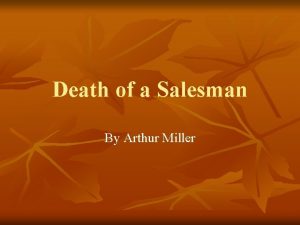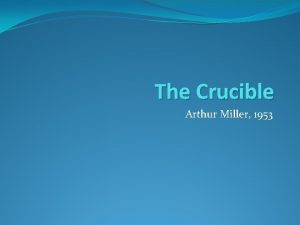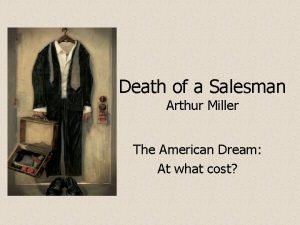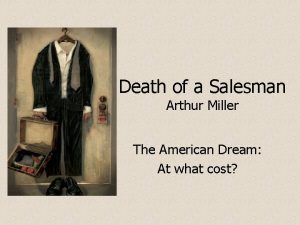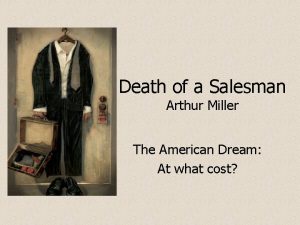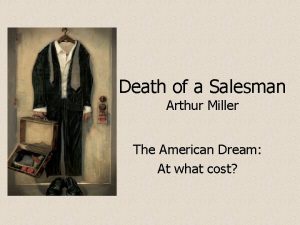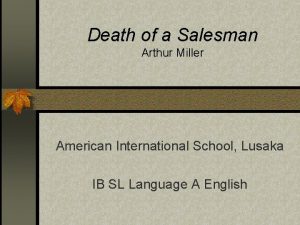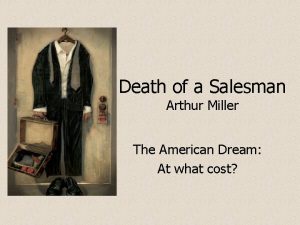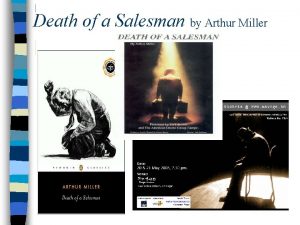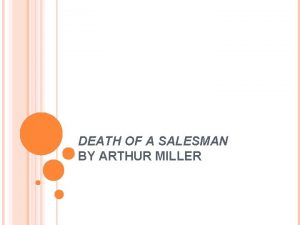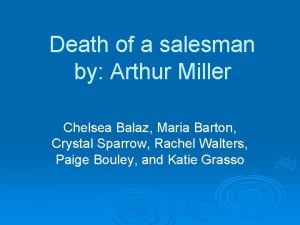Death of a Salesman Arthur Miller The American




































- Slides: 36

Death of a Salesman Arthur Miller The American Dream: At what cost?

About the Playwright: Arthur Miller Ø Born in New York City on October 17, 1915 Ø Began as playwright at University of Michigan Ø Pulitzer Prize winner for Death of A Salesman Ø Double winner of New York Drama Critics Circle Award

Miller’s Legal Troubles Ø Suspected of being a Communist sympathizer Ø Death seen as un-American Ø Miller has troubles with the HUAC/Mc. Carthy Ø 1953 - Miller denied a passport Ø 1955 - HUAC pressures NYC not to allow Miller to make a film for them on juvenile delinquency

The Saga Continues. . . Ø 1957 - Miller convicted of contempt of Congress for refusing to names And then. . . Ø 1958 - US Court of Appeals overturns his contempt conviction

Miller’s Assertions Ø Death is not a “document of pessimism. ” Ø Death is not un-American; it celebrates the life of Willy Loman. Ø Miller believes that tragedy is “inherently optimistic. ”

From Classical Tragedy Ø Unity of time -- the final 24 hours in Willy’s life Ø Unity of action - the play is complete unto itself Ø the tragic hero…with a twist

Also from Classical Tragedy Ø the hero’s traits, esp. being a mixture of good and bad and being of higher moral worth than others in society Ø the concept of the hero’s flaw Ø the hero’s capacity to willingly endure suffering Ø the catharsis of the audience

Initial Themes Ø Addresses family conflict in post World War II America Ø Takes a close look at the price paid for the “American Dream” Ø Charges America with creating a capitalist materialism centered around a postwar economy Ø This materialism skewed the original view of the “American Dream” as envisioned by the founding fathers


Themes in Death Ø Willy Loman as a modern tragic hero Ø An individual’s search for meaning and purpose in life (not Willy, but Biff) Ø failure in pursuit of success Ø Man’s need to “leave a thumbprint somewhere in the world. ” Ø An examination of the materialistic values of society

More themes in Death Ø The love of a father for a son and a son (Biff) for a father Ø The conflict between father and son Ø The question of who shall wield the power? Ø the problem of communication

Add: Themes Ø Abandonment: The not-so-positive transient nature of mankind Ø Betrayal: Willy’s primary obsession (Biff)

Symbols Ø Seeds: opportunity for growth, but will not always germinate. Ø Diamonds: Material & tangible wealth Ø The Woman’s Stockings: betrayal and infidelity. Ø The Rubber Hose: Suicide Ø Alaska, Africa…The American West: success and failure

Characteristics of the Tragic Hero "A man doesn't become a hero until he can see the root of his own downfall. " ~Aristotle Six Characteristics of the Tragic Hero: Ø Nobility or wisdom (by birth) Ø A flaw or error of judgment (Hamartia) Ø A reversal of fortune (perepetia) Ø The discovery or recognition that the reversal was brought about by the hero's own actions (anagnorisis) Ø The audience must feel dramatic irony for the character. Ø The character's fate must be greater than deserved.

A few key traits of the T. H. Ø Usually evokes empathy… Ø Has a weakness, usually pride Ø Something has gone awry in his/her life Ø Usually faced with a very serious decision he must make Ø Noble in nature Ø Must understand his mistakes… Ø Likely doomed from the start… Ø Begins his “journey” as no better or worse than the rest of us…

The Common Man as Hero Miller’s thoughts: Ø “Everyone knows Willy Loman. ” (allusion to the morality play, Everyman. ) Ø “The common man is suitable for a tragic hero. ” Ø Willy is meant to be seen as greater and better (at least in potential) than his society.

Miller’s Modern Tragedy Ø The hero is a common man. hero struggles against society. hero meets his downfall is a result of an incongruity between his own perception of the world and reality. Ø The hero achieves a kind of redemption in his downfall.

Artistic Inspiration. Expressionism

What is Expressionism International movement in art and architecture, which flourished between c. 1905 and c. 1920, especially in Germany. It also extended to literature, music, dance and theatre. The term was originally applied more widely to various avant-garde movements.

Elements of Expressionism What is it? How does it work? Ø Expressionism attempts Ø Use of exaggeration, to depict not objective reality but rather the subjective emotions and responses that objects cause primitivism, and fantasy Ø Use of the vivid, jarring, violent, or dynamic application of formal elements.

Elements of Expressionism in DOS Musical motifs – evoke time frames, emotions, values Whistling – satisfaction, tension, the outdoors Lighting and Set design – contrasting light and shadow, overhead, rear lighting angles, color Costumes – allows characters to split into younger versions of themselves

Death of a Salesman is also a Morality Play Ø Late medieval genre Ø Encouraged by the church and civil authorities because they taught social and moral values through amusing dramatic actions. Ø Morality characters are allegorical; plot’s action must be interpreted as teaching something about the human condition. Ø Often dramatize man’s struggle to avoid vice and seek virtue.

Elements of Morality Plays Ø Allegory Ø Form of extended metaphor in which objects and persons within a narrative are equated with meanings that lie outside the narrative itself. Ø Two levels of meaning Ø Literal Ø What the figures do in the narrative Ø Symbolic Ø What the figures stand for, outside the narrative

Ø Allegory Ø May involve personification of ØAbstract qualities (Truth, Beauty) ØAn event (Death) ØAnother sort of abstraction (Una in Spenser’s Faerie Queene = the one True Church) ØHistorical personage (Piers Plowman = Christ) Ø Characters, events, and setting may be historical or fictitious.

Ø Allegory Ø Test is that characters, etc. , must represent meanings independent of the action described in the surface story. Ø On the surface: ØEveryman is about a man who sets out on a journey and the people he meets. ØBook I of the Faerie Queene is about a knight killing a dragon and rescuing a princess. Ø What is Death of Salesman about on the Surface vs. symbolically?

Act 1 An air of the dream clings to the place, a dream rising out of reality. Ø How does this serve to foreshadow Willy Loman’s life?

Major Characters Ø Willy Loman Ø Biff Loman Ø Linda Loman Ø Happy Loman Ø Charley Ø Bernard Ø Ben Ø The Woman Ø Howard Wagner Ø Stanley Ø Jenny Ø Miss Forsythe and Letta

Willy Loman Ø Father, traveling salesman Ø Believes in chasing the American Dream although he never achieves it Ø Pins his failed hopes on his sons, Biff and Happy Ø Becomes mentally ill when pressure of reality crushes his illusions

Biff Loman Ø Elder son, 34 years old Ø High school standout-football star, many male friends, and female admirers Ø Academic failures lead to a life of kleptomania Ø Represents Willy’s vulnerable, tragic side Ø Fails to reconcile his father’s expectations

Linda Loman Ø Loving, devoted wife Ø Naïve and realistic of Willy’s hopes Ø Emotionally supportive of Willy Ø Willy’s strength until his tragic perishing

Happy Loman Ø Younger son, 32 years old Ø In Biff’s shadow all his life Ø Relentless sex and professional drive Ø Represents Willy’s sense of self importance and ambition Ø Often engages in bad business ethics

Charley Ø The Lomans’ next door neighbor Ø Successful businessman Ø Often gives Willy financial support Ø Described sadly as Willy’s only friend although Willy is jealous of Charley’s success

Bernard Ø Charley’s son Ø Successful lawyer Ø Often mocked by Willy for being studious Ø Compared to Loman sons by Willy; they do not measure up to his success

Ben Ø Willy’s deceased older brother Ø Independently wealthy Ø Appears to Willy in daydreams Ø Willy’s symbol of success that he desperately wants for his sons

The Woman Ø Willy’s mistress Ø Her admiration for Willy is an ego boost Ø Biff catches Willy with her in a hotel room Ø Biff loses faith in his father due to infidelity

WILLY: I'm not interested in stories about the past or any crap of that kind because the woods are burning, boys, you understand? There's a big blaze going on all around. I was fired today. BIFF (shocked): How could you be? WILLY: I was fired, and I'm looking for a little good news to tell your mother, because the woman has waited and the woman has suffered. The gist of it is that I haven't got a story left in my head, Biff. So don't give me a lecture about facts and aspects. I am not interested. Now what've you got so say to me? (from Death of a Salesman)
 Stanley the waiter at frank's chop house
Stanley the waiter at frank's chop house Daniel miller arthur miller
Daniel miller arthur miller Death of a salesman american dream theme
Death of a salesman american dream theme Death of a salesman as an american tragedy
Death of a salesman as an american tragedy Death of a salesman american dream theme
Death of a salesman american dream theme American dream death of a salesman
American dream death of a salesman What is the american dream in death of a salesman
What is the american dream in death of a salesman Death of a salesman historical context
Death of a salesman historical context Naturalism in death of a salesman
Naturalism in death of a salesman Death of salesman act 2
Death of salesman act 2 Death of a salesman audiobook act 1
Death of a salesman audiobook act 1 Death of a salesman summary
Death of a salesman summary Symbolism of seeds in death of a salesman
Symbolism of seeds in death of a salesman Requiem death of a salesman
Requiem death of a salesman Death of a salesman themes
Death of a salesman themes Death of a salesman act one
Death of a salesman act one Setting of death of a salesman
Setting of death of a salesman Death of a salesman act 3
Death of a salesman act 3 Florida idea death of a salesman
Florida idea death of a salesman Expressionism death of a salesman
Expressionism death of a salesman Death of a salesman act 1 summary
Death of a salesman act 1 summary The death of the salesman summary
The death of the salesman summary Death of a salesman act 2 scene 2
Death of a salesman act 2 scene 2 Death of a salesman conclusion
Death of a salesman conclusion Death of a salesman marxism
Death of a salesman marxism Death of a salesman questions
Death of a salesman questions Judge thomas danforth
Judge thomas danforth Happy loman
Happy loman Mercy lewis physical description
Mercy lewis physical description Huac arthur miller
Huac arthur miller Arthur miller information
Arthur miller information Whats a crucible
Whats a crucible The crucible overture summary
The crucible overture summary Arthur miller died
Arthur miller died Arthur miller early life
Arthur miller early life Arthur asher miller
Arthur asher miller All my sons genre
All my sons genre
